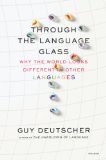Summary | Excerpt | Reviews | Beyond the Book | Readalikes | Genres & Themes | Author Bio

Critics' Opinion:
Readers' Opinion:
First Published:
Aug 2010, 320 pages
Paperback:
Aug 2011, 320 pages
 Book Reviewed by:
Book Reviewed by:
Jo Perry
Buy This Book
The only problem with this impressive international unanimity is that it breaks down as soon as thinkers move on from the general principles to reflect on the particular qualities (or otherwise) of particular languages, and about what these linguistic qualities can tell about the qualities (or otherwise) of particular nations. In 1889, Emerson's words were assigned as an essay topic to the seventeen-year-old Bertrand Russell, when he was at a crammer in London preparing for the scholarship entrance exam to Trinity College, Cambridge. Russell responded with these pearls: "We may study the character of a people by the ideas which its language best expresses. French, for instance, contains such words as 'spirituel,' or 'l'esprit,' which in English can scarcely be expressed at all; whence we naturally draw the inference, which may be confirmed by actual observation, that the French have more 'esprit,' and are more 'spirituel' than the English."
Cicero, on the other hand, drew exactly the opposite inference from the lack of a word in a language. In his De oratore of 55 bc, he embarked on a lengthy sermon about the lack of a Greek equivalent for the Latin word ineptus (meaning "impertinent" or "tactless"). Russell would have concluded that the Greeks had such impeccable manners that they simply did not need a word to describe a nonexistent flaw. Not so Cicero: for him, the absence of the word was a proof that the fault was so widespread among the Greeks that they didn't even notice it.
The language of the Romans was itself not always immune to censure. Some twelve centuries after Cicero, Dante Alighieri surveyed the dialects of Italy in his De vulgari eloquentia and declared that "what the Romans speak is not so much a vernacular as a vile jargon . . . and this should come as no surprise, for they also stand out among all Italians for the ugliness of their manners and their outward appearance."
No one would dream of entertaining such sentiments about the French language, which is not only romantic and spirituel but also, of course, the paragon of logic and clarity. We have this on no lesser authority than the French themselves. In 1894, the distinguished critic Ferdinand Brunetière informed the members of the Académie française, on the occasion of his election to this illustrious institution, that French was "the most logical, the clearest, and the most transparent language that has ever been spoken by man." Brunetière, in turn, had this on the authority of a long line of savants, including Voltaire in the eighteenth century, who affirmed that the unique genius of the French language was its clearness and order. And Voltaire himself owed this insight to an astonishing discovery made a whole century earlier, in 1669, to be precise. The French grammarians of the seventeenth century had spent decades trying to understand why it was that French possessed clarity beyond all other languages in the world and why, as one member of the Académie put it, French was endowed with such clarity and precision that simply translating into it had the effect of a real commentary. In the end, after years of travail, it was Louis Le Laboureur who discovered in 1669 that the answer was simplicity itself. His painstaking grammatical researches revealed that, in contrast to speakers of other languages, "we French follow in all our utterances exactly the order of thought, which is the order of Nature." No wonder, then, that French can never be obscure. As the later thinker Antoine de Rivarol put it: "What is not clear may be English, Italian, Greek, or Latin" but "ce qui n'est pas clair n'est pas français."
Not all intellectuals of the world unite, however, in concurring with this analysis. Equally distinguished thinkers— strangely enough, mostly from outside France—have expressed different opinions. The renowned Danish linguist Otto Jespersen, for example, believed that English was superior to French in a whole range of attributes, including logic, for as opposed to French, English is a "methodical, energetic, business-like and sober language, that does not care much for finery and elegance, but does care for logical consistency." Jespersen concludes: "As the language is, so also is the nation."
Excerpted from Through the Language Glass by Guy Deutscher. Copyright © 2010 by Guy Deutscher. Excerpted by permission of Metropolitan Books. All rights reserved. No part of this excerpt may be reproduced or reprinted without permission in writing from the publisher.





The Funeral Cryer by Wenyan Lu
Debut novelist Wenyan Lu brings us this witty yet profound story about one woman's midlife reawakening in contemporary rural China.
Your guide toexceptional books
BookBrowse seeks out and recommends the best in contemporary fiction and nonfiction—books that not only engage and entertain but also deepen our understanding of ourselves and the world around us.